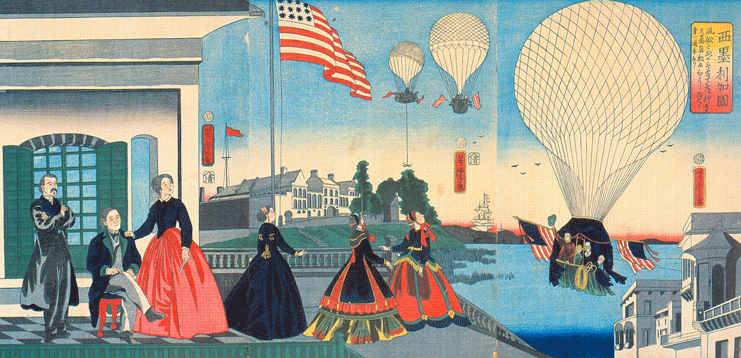
 |
Utagawa Yoshitora, in his painting "Amerikakoku" (1867), imagines an American city and its hot air balloons. |
|
Honors A&S 262: World Civilization I Mondays, Tuesdays, Wednesdays, and Thursdays, 9:40-11:50 a.m. Self and Other: |
This course will explore the concept of alterity, or “otherness,” and representations of Japan. Although the focus will be fiction originally written in Japanese (although read here in English translation), these texts will be complemented by a small sample of full-length films, both live-action and animated. Simultaneously, we will examine our own positionality by considering filmic representations of Japan from recent years. Finally, we will look at a few additional texts, mostly non-fiction, that are particularly provocative in understanding not only the concept of alterity, but also the specific fantasy that is often projected upon Japan. Our goal is to better understand the way concepts of “self” and “other” affect the way people interpret difference, manage desire, and understand the world. Please note that the schedule below remains TENTATIVE and is subject to change. |
Reading Schedule
| 7/24 (Thursday) | Introduction |
| 7/25-7/27 (Weekend Viewing) | 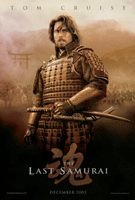 "The Last Samurai" (2004) |
| 7/28 (Monday) | Discussion: "The Last Samurai"; G.W.F. Hegel, Phenomenology of Spirit (1807), #178-196; Jean-Paul Sartre, Being and Nothingness (1943), 301-15; Simone de Beauvoir, The Second Sex, introduction (1949); NYT on SS trans. |
| Oscar Wilde, “The Decay of Lying” (1889); Alexandre Kojève, Introduction to the Reading of Hegel, footnote, 159-162 (1959); Roland Barthes, Empire of Signs (1970), 3-4; Mori Ôgai, “The Dancing Girl” (1890), 10-25 | |
| 7/29 (Tuesday) | Kunikida Doppo, “Meat and Potatoes” (1901), 153-67; Nagai Kafû, “The Mediterranean in Twilight” (1915), 213-17 |
| Akutagawa Ryûnosuke, “The Christ of Nanking” (1920), 347-55 | |
| 7/30 (Wednesday) | Tani Jôji, “The Shanghaied Man” (1925), 528-39 |
| Kuroshima Denji, “A Flock of Circling Crows” (1927), 462-80 | |
| 7/31 (Thursday) | Itô Sei, “A Department Store Called M” (1931), 418-28 |
| Dazai Osamu, “December 8th” (1942), 660-67; Nakajima Atsushi, “The Ox Man” (1942), 703-08 | |
| 8/1-8/3 | 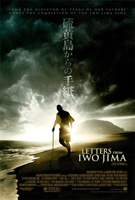 "Letters from Iwo Jima" |
| 8/4 (Monday) | Hand in writing assignment #1; Discussion: "Letters from Iwo Jima" |
| John Dower, War Without Mercy, 3-15 and 234-61 | |
| 8/5 (Tuesday) | Kajiyama Toshiyuki, “The Clan Records” (1961), 675-702 |
| Ishikawa Jun, "The Jesus of the Ruins" (1946), II:149-67 | |
| 8/6 (Wednesday) | Noma Hiroshi, "A Red Moon in Her Face" (1947), II:273-92 |
| Takeda Taijun, "The Misshapen Ones" (1950), II:369-91 | |
| 8/7 (Thursday) | Ôe Kenzaburô, "Prize Stock" (1958) |
| Mishima Yukio, "Patriotism" (1960), II:255-73 | |
| 8/8-8/10 (Weekend Viewing) | 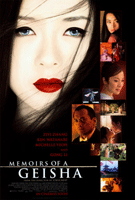 "Memoirs of a Geisha" |
| 8/11 (Monday) | MIDTERM |
| Hand in writing assignment #2; Discussion: "Memoirs of a Geisha" | |
| 8/12 (Tuesday) | Viewing: Naruse Mikio, "When a Woman Ascends the Stairs" (1963) |
| Discussion: "When a Woman Ascends the Stairs" | |
| 8/13 (Wednesday) | Shimao Toshio, "The Departure Never Came" (1962), 756-78 |
| Shiba Ryôtarô, "Date's Black Ship" (1964), II:300-25 | |
| 8/14 (Thursday) | Kurahashi Yumiko, “To Die at the Estuary” (1970), II:209-41 |
| Shima Tsuyoshi, "Bones" (1973), II:669-80 | |
| 8/15-8/17 (Weekend Viewing) | 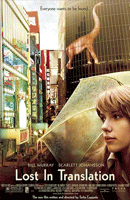 "Lost in Translation" |
| 8/18 (Monday) | Discussion: "Lost in Translation" |
| Jean Baudrillard and Marc Guillaume, Radical Alterity (1990-91) | |
| 8/19 (Tuesday) | Viewing: Teshigahara Hiroshi, "Woman in the Dunes" (1964) |
| Viewing: Teshigahara Hiroshi, "Woman in the Dunes" (1964) | |
| 8/20 (Wednesday) | Discussion: "Woman in the Dunes" |
| Kaikô Takeshi, "The Crushed Pellet" (1978), II:586-94 | |
| 8/21 (Thursday) | Tawada Yôko, "Where Europe Begins" (1988); II: 698-711 |
| Ikezawa Natsuki, "Revenant" (1990), II:553-86 | |
| 8/22 (Friday) | FINAL EXAM |
Most stories above appear in the following anthologies:
J. Thomas Rimer and Van C. Gessel, eds., Modern Japanese Literature, vol. 1 |
 |
J. Thomas Rimer and Van C. Gessel, eds., Modern Japanese Literature, vol. 2 |
 |
Purchasing volume 1, which is available in soft cover, is recommended. Both volumes will be available on reserve in the East Asian Library.
EXPECTATIONS and GRADING
PREREQUISITES: Japanese language ability is not a prerequisite for this class; all readings are in English translation.
PARTICIPATION: All class members will be expected to complete all assigned readings before class meets. Each member will be expected to participate actively in classroom discussion. In addition, students will be expected to submit two short writing assignments. Late arrivals disrupt class; therefore you are expected to arrive on time. Please turn off all beepers and cell phones before class begins.
EXAMINATIONS: Two exams will be given, each made up of identification questions and short essay questions.
GRADING: Your final grades will consider your participation (40%), your mid-term exam (30%), and your final exam (30%). Though the quality of your work is central to your grade, evaluations of that quality will take into consideration individual skills. Effort will be rewarded.
STUDY GROUPS: I encourage students to meet outside of class to discuss the texts. Please note that this does not include dividing up the reading of a story; all students will be expected to have read all of the stories, in full.
CHEATING AND PLAGIARISM: The presentation of another's words and ideas as one's own is a serious offense; violations will be dealt with according to the University codes of conduct, which stipulate sanctions up to and including expulsion.
ACADEMIC ACCOMMODATIONS: I will do everything I can to accommodate students with particular needs. To request such an accommodation, please contact Disabled Student Services, 448 Schmitz, (206) 543-8924 (V/TTY). If you have a letter from Disabled Student Services indicating that you require such accommodation, we can discuss ways to meet those needs.
SUPPLEMENTARY MATERIALS:
Participation, preparation, and writing assignments (40%):
All class members will be expected to complete assigned readings before class meets. The participation grade will be determined by your participation in classroom discussion and your writing assignments.
Midterm Exam (30%; Monday, 11 August 2008, 10:50-11:50):
The midterm exam will be made up of short identification questions and essay questions covering the first half of the course. Essay questions will be quotes from the works; you will be expected to give the name and date of the work the passage comes from, briefly (one sentence) identify the subject matter of the work as a whole, explain what is going on in the quote (the characters, the situation, and where it fits in the larger story), and discuss how the characters and situation represented in the quote engage at least two themes we’ve addressed in this course. You will be expected to explain and support your view of what the passage says about these themes.
Please bring at least one blue book to the exam.
Final Exam (30%; Friday, 22 August 2008, 9:40-11:50):
The final exam will be made up of short identification questions and essay questions covering the second half of the course. Essay questions will be quotes from the works; you will be expected to give the name and date of the work the passage comes from, briefly (one sentence) identify the subject matter of the work as a whole, explain what is going on in the quote (the characters, the situation, and where it fits in the larger story), and discuss how the characters and situation represented in the quote engage at least two themes we’ve addressed in this course. You will be expected to explain and support your view of what the passage says about these themes.
Please bring at least one blue book to the exam.
The copyright law of the United States (Title 17, United States Code) governs the making of photocopies or other reproductions of copyrighted materials. Under certain conditions specified in the law, libraries and archives are authorized to furnish a photocopy or other reproduction. One of these specified conditions is that the photocopy or reproduction is not to be "used for any purpose other than private study, scholarship, or research." If a user makes a request for, or later uses, a photocopy or reproduction for purposes in excess of "fair use," that user may be liable for copyright infringement.
Page last updated on August 19, 2008